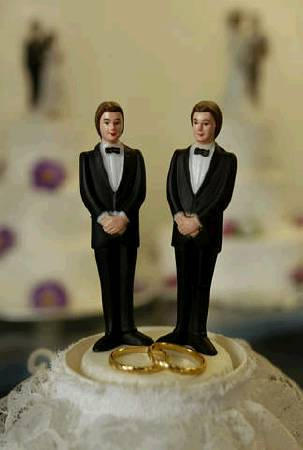This morning at Mass, I distributed the Australian bishops’ recent pastoral letter on marriage. Despite its assertive title — Don’t Mess With Marriage — it is a very mild document.
The document presents a case for traditional marriage which seeks to be as inoffensive as possible. By this measure, the document has failed. Here’s a few headlines to prove it:
- Anti-same-sex marriage booklet sent to Catholic schools ‘degrades’ gay students
- Catholic Church “desperate” after handing out anti-gay marriage booklets to children: Brisbane priest
- Penrith Catholic students burn ‘anti-gay’ booklets
- Don’t Mess With Marriage booklet could breach Anti-Discrimination Act
The supreme irony in this is that the document nowhere refers to the Church’s “most offensive” (read, most counter-cultural) moral teachings. No mention of the grave immorality of homosexual acts. No mention of objectively disordered inclinations. These teachings constitute the elephant in the room.
I spoke to a priest last week who was quite animated in his defence of traditional marriage. “Marriage can only occur between a man and a woman. If a same-sex couple came to me, I’d be very happy to bless them. I’d pray that they find God in their love for each other, and goodness in their life together. But it’s not marriage.”
Right. It’s not marriage. But what that priest said isn’t Catholic teaching either. A gravely immoral relationship can’t be blessed. This priest’s position is incompatible with the Catholic moral tradition. But it’s not incompatible with Don’t Mess With Marriage. I don’t wish to suggest that the bishops’ pastoral letter condones same sex relationships. That’s a logical leap too far. But certainly, the letter is ambiguous. It fails to present the full Catholic teaching on the subject.
For this reason, I also distributed to parishioners a much more comprehensive document. In 2003, Pope John Paul II approved the CDF’s Considerations Regarding Proposals to Give Legal Recognition to Unions Between Homosexual Persons. The title is much longer than the Australian bishops’ letter, but the document itself is much shorter. It’s also much more “offensive” — in that it doesn’t mince words and includes very direct exhortations.
For example:
Sacred Scripture condemns homosexual acts “as a serious depravity… (cf. Rom 1:24-27; 1 Cor 6:10; 1 Tim 1:10). This judgment of Scripture does not of course permit us to conclude that all those who suffer from this anomaly are personally responsible for it, but it does attest to the fact that homosexual acts are intrinsically disordered.” This same moral judgment is found in many Christian writers of the first centuries and is unanimously accepted by Catholic Tradition.
And:
When legislation in favour of the recognition of homosexual unions is proposed for the first time in a legislative assembly, the Catholic law-maker has a moral duty to express his opposition clearly and publicly and to vote against it. To vote in favour of a law so harmful to the common good is gravely immoral.
Here we have language which is deeply provocative, and I can understand why it wasn’t used in the Australian bishops’ pastoral letter. The bishops want to teach and edify. They don’t want to offend.
But here’s the thing. Catholic teaching on homosexuality is offensive to a growing proportion of the population. We only have to review those headlines above to confirm it. As disciples of Jesus Christ, Catholics need to be comfortable with this. Our Lord, who of course excelled at speaking the truth with love, wasn’t very nice. He offended people left, right and centre. Why should things be different for us?
The furore caused by Don’t Mess With Marriage despite its mild presentation, suggests to me that we may as well be direct and avoid ambiguity. Hence my recommendation to parishioners to take and read both the bishops’ letter, and the CDF’s Considerations.
Many times in the last few years, I have heard bishops and cardinals call for a review of the language the Church uses. To cite a recent example, consider Cardinal Diarmuid Martin’s response to Ireland’s gay marriage yes vote:
“It’s very clear that if this referendum is an affirmation of the views of young people, then the Church has a huge task in front of it to find the language to be able to talk to and to get its message across to young people, not just on this issue, but in general.”
I think this is dead wrong. It’s also a bit patronising. “Marriage equality” activists aren’t offended by the language of Catholic moral teaching. They’re offended by the content. The Church has never waged a petty war of words. The Church is engaged in the noble battle of ideas.
Put another way, the “messaging remedy” is not semantic. The remedy is something which was banished from the Church’s seminaries and universities and schools 50 years ago, at great cost. The remedy is apologetics.






Thanks Fr John for your frank comment on this issue. I am still waiting to hear a single word uttered in my Parish from the pulpit on this issue. It disappoints me greatly that parish priests either fear offending the parishioners, or, worse still that they accept the ”popular’ view that SSM is inevitable. A general view in the Australian community seems to suggest we must give evil equal time lest we discriminate.
Let me tell you, preaching on this stuff is neither easy, nor pleasant. A priest I know also spoke on this matter on Sunday, and he said he was shaking.
Don’t blame priests for silence at the pulpit. Not that you’re doing this here Pat. But we must never stop praying for bishops and priests, that they can be heroic in exercising their duty to speak the truth with love.
We do face a time of trial indeed father and we sure need courageous shepherd to lead the flock. God Bless you and all our priests, bishops and all religious. As laity we do our best to instruct our children and go down on our knees seeking God’s Mercy when things go out of hand and governments forget what is truly right. May the Holy Spirit give us the boldness to preach and practice the Good News.
Amen!
Yes, the bishops’ letter is out but I have not heard any priest speak out against this from the pulpit. I guess, some idiot would bring him down if he did. Also, I guess good Catholics families should openly protest at this ridiculous nonsense of same-sex marriage. This is very sinful.
In a way, I guess the bishops’ letter is means by which the priest need not raise the issue directly. After all, it is very significant that we can find the letter in all our churches!
As I was reading this, I was reminded of a quote from the West Wing episode where President Bartlet is debating Governor Ritchie.
Sam mentioned that it didn’t matter how the President performed on debate night, he was going to be seen as arrogant anyway, so they decided to “knock some bodies down” with his arrogance.
If the Church is going to be accused of being hateful no matter which language we use on this issue, we might as well use it as an opportunity to present the fulness of Catholic teaching.
Thanks so much for this very insightful (and very challenging) piece!
Ha. Let Bartlet be Bartlet. I love it!
Can every matter in the world be enriched by a West Wing analogy? I think so – at least in the case of the first four seasons, when Aaron Sorkin wrote the lot.
I thought is was quite a good article by the Australian Bishops.
I also have heard Priests preaching against homosexuality quite plainly with words to the effect of, you are either going up or down, Heaven or hell, your choice. God gave you free will, and people need to understand that if one messes with marriage be it adultry,sodomy, divorce ect. and the undermining of the natural family unit there are consequences.
It was also preached at a parish school Mass, to which there were some very uncomfortable people shuffling in the pews.
However I do also agree with Fr. John, apologectics needs to be taught and has been sidestepped for too long. well done Fr. John for providing additional reading material to your congregation, they are indeed blessed to have you as parish Priest.
Pray for our Bishops that they may have the courage to assert their Authority without fear, for the good of all humanity.
I agree completely Cathy. It is an excellent article by the bishops. God bless them for being faithful in this very unpleasant task.
Thanks for bringing this up, Fr John.
It is an act of courage now. Opposing homosexual mirage seems to unleash the rage of the demons like nothing else. I am glad the Australian Bishops have issued a statement against it.
I once heard Professor Phillip Ney describe in great detail the effects of sodomistic acts on the bodies of the perp and the victim. It was so horrific and disgusting I prayed to have it erased from my mind.
Maybe a circular describing what happens in and the consequences of homosexual acts might wake some people up.
Every person who isn’t married is morally b0und to be celibate and chaste… even married people sometimes.
Anybody would think celibacy killed people, but it is unchastity which results in death, often.
Most excellently written Father. Please, please, please keep speaking the truth, no matter how “offensive” it seems.
Thank you and God bless you.
This is a nasty mean spirited message. Thank God this man is not a bishop and not writing the kind of stuff he puts on his blog for general distribution. Words matter. Words can incite hatred, violence, bigotry, misunderstanding and division. Words can break hearts, tear families apart and destroy lives. The words used in the 2003 document are these kinds of words – they call any civil rights for gay couples “the legalisation of evil”. This document is so extreme and offensive that most bishops around the world have ignored it and not quoted it in the recent debates. This priest has a serious problem if he thinks official words are more important than real people’s lives. He is also out of step with the pope, who at least gets the point that you can’t talk about God’s love while vilifying people.
Thanks Michael for your contribution. Your comment is a needed reminder that words do matter, which is not something I acknowledged in my post. There can be a world of difference between speaking the truth, and speaking the truth with love, and only one of these options is available to faithful disciples of Jesus Christ. Veritas in caritate isn’t a trite formula, it’s a grave moral obligation that I take seriously, I assure you. I have never, and will never, tolerate bigoted language or engage in uncharitable debate.
I am always conscious of my obligation to heed the Holy Father and assent with mind and will. So I must challenge your claim out that I am out of step with Pope Francis on this issue. In this matter, he has used language much more inflammatory than anything you find in my post.
But at least you and I can find agreement on one matter. I’d be a lousy bishop!
May I too speak plainly, Fr John?
Not that I want to offend you, not only do you not deserve that, even if you did, it would be uncharitable. You’re trying to do the right thing, though we may disagree on what that is. In the details anyway.
Moving right along..
The 2004 change to the Australian marriage law made our marriage voidable. Out of purely selfish reasons, not claiming any moral high ground here, I wish the change to be reversed.
I want our son to be allowed to have 2 married biological parents.
I want, no, I demand, not that the Church change its policy towards the marriage of Intersex people, for there may be good doctrinal reasons for that policy, but to explain both what the policy is, and what the justification is, without prevarication and bad faith, dissembling, concealment and dishonesty.
I better back up such condemning words with evidence, lest I be seen as “bearing false witness”.
From the Legal and Constitutional Affairs Legislation Committee : 03/05/2012 : Marriage Equality Amendment Bill 2010. Mr Meney is the Director of the Life, Marriage & Family Centre, Catholic Archdiocese of Sydney, and speaking in his official capacity.
Cunning words. It is true that those with Turner or Klinefelter syndrome are widely regarded as being mentally handicapped in some way. He wasn’t directly lying. But he knows full well that those widely held beliefs are erroneous. False. Factually wrong.
It’s that kind of careful, cunning casuistry that Intersex people have come to expect from the Church, along with actions that contradict any dissembling about “the Magisterium hasn’t spoken on the issue”. No it hasn’t, but the Church has devoted much time and money into the fight to stop Intersex people being married in a secular sense, and their actions speak louder than their words. And their silence.
I know this is “above your pay grade”. But maybe if you could ask questions up the chain of command, you might at least get the courtesy of a reply. We haven’t.
Moreover, since you feel entitled to give guidance on the issue of marriage equality, you’ve put yourself in the firing line here.
Please don’t lose any sleep over this though. I know that those with most goodwill and kindness will be the ones most troubled by this. I know this is a knotty issue, and I understand if you’re not able to give a good answer. Just be aware of what’s going on, that’s all.
I must disagree with you in one area. Not only do I think you’d be a good bishop, but you’d likely do a good job as a Cardinal. Better than many who have been elevated to that position, anyway.
This. This is spot on:
Your request is not only reasonable Zoe, but also just. The Church has an obligation to proclaim the truth with love, and people have a right to that.
It is true that I do not have an answer, but surely there must be one. I’ll let you know.
52 years ago I overheard a nun telling a friend of mine her parents eere going to hell because her mother had married a non-catholic. This would never happen today but the gospel of anger and rectitude will always trump the gospel of love for some people. According to the church I need to be married in the church for the marriage to be true. The church does not speak out against civil marriage so why do we care what the state chooses to call marriage. Leave the judgement to God we are in the love and compassion business.
Just to clarify, “civil marriage” is not a type of marriage. “Civil marriage” is a WAY of marrying available to non-Catholics. There’s no reason to criticise that.
Moreover, the Church’s mission cannot be reduced to loving. The Church must teach and sanctify, and its obligation to truth is equal to its obligation to love. Of course, love and truth must never be opposed, so I also agree with much of what you’re saying Liz.
Thanks for your article Father. I appreciate it is not easy. However, I am sure that St Paul would be in trouble with today’s rulers as much as in his own time.
Unfortunately this is the kind of hateful rhetoric that has led me to reconsider my Christian faith. How can any Christian preach words that lead to such negative consequences, I dread to think what some poor kids go through in the congregation listening to this, this is directly what leads to youth depression and suicide for those feeling confused about sexuality. I know this to be true as I have worked with people who have been impacted by hateful ‘Christian’ teachings.
I think you should be ashamed. I think you should try to help people rather that preach hurtful words.
Hi Mal. I am sorry you think my post is hateful. This was not my intention.
I think “the elephant in the room” in your own statement might be Jesus Christ himself. Where is he, in your understanding of Christian teaching? I don’t ask that in a provocative way. I ask it, only because this is where Christians really have to wrestle with one’s natural desire to be nice, and one’s obligation to be faithful to the Master, who was not always nice. Though of course Jesus never fails to love unconditionally, which is something we must all aspire to imitate.
Good for you for being so humble, charitable and gracious in the face of such abuse and malice, Father John. This is indeed the type of martyrdom we faithful Catholics have to get used to. It hurts, though, doesn’t it? A privilege to share Christ’s wounds.
An aside: looking at the new priests over the past couple of days, I am struck how their beings are somehow deeper, stronger; somehow more substantial and there is a special light in their eyes. What beauty in the man who has nailed himself with Jesus to the Cross!
If only those who shriek for evil could see themselves as others do. But would they survive?
Oremus.
Fr John, your post on the Australian Bishops’ pastoral letter is smack bang on the money. Since Humanae Vitae, they have failed to enunciate, explain and defend the Church’s doctrines on the sexuality and the sanctity of Marriage as stipulated in the Catechism of the Catholic Church in the public square. They have lost the battle to the state and the horse has bolted so to speak, and still these leaders cannot even courageously, properly and truthfully address what is really a symptom of their enduring silence and neglect. For example, how many Catholics know and understand that marriage and indeed all the sacraments have their foundation in the Mystery of the Holy Trinity? And that marriage as a vocation and indeed all vocations in their essential dimensions derive their meaning, purpose and fulfilment in and from the Church, Bride of Christ and her call to holiness.
I can’t agree completely Gregory. I think the letter, as it stands is very good. Courageous even. I do agree, though, with your assessment of recent decades, which is why in this instance we might have expected silence or a much weaker statement from the Bishops’ Conference. All things considered, I think Don’t Mess With Marriage is symptomatic of new and encouraging developments in the ACBC.
Fair enough Fr John, thanks for responding. What I was alluding to in my comment is that ‘same sex marriage is really a byproduct of the divorce and cohabitation epidemic brought about by the sexual revolution of the feminist, during which Church leaders in this country and else where fell silent and have remained silent. Consequently, the battle for the sanctity and indissolubility of marriage was lost in the public square. This resulted in far more devastating consequences on traditional marriage, family life and society than say ‘same sex marriage’, a battle by the way, which the Church in the West will lose yet again. This is what I meant by symptomatic.